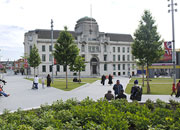Welcome
Make no mistake, Greenwich is a fantastic place to work. We have some incredibly diverse and vibrant communities, the largest waterfront in London, the busiest entertainment venue in the country and we are home to a UNESCO World Heritage Site.
The 2012 Olympics raised our profile even further and brought a sharper focus on how best we can provide high quality public realm and community safety services to both residents and visitors. In common with other local authorities, we face the challenge of course of a tight financial climate and unlike some local authorities, our resident population is set to grow considerably over the coming years.
Our current Senior Assistant Director is retiring after many years of tremendous service to the Borough and will leave a strong legacy for you to inherit. You will also benefit from some structural changes that will see parks and open spaces join this service area. How you lead this new grouping of around 800 people and navigate through the challenges over the next few years will make a critical difference to the future of Greenwich.
I urge you to read the information on this website and hope that you find the following pages of interest.
Matthew Norwell - Director of Community Safety and Environment


